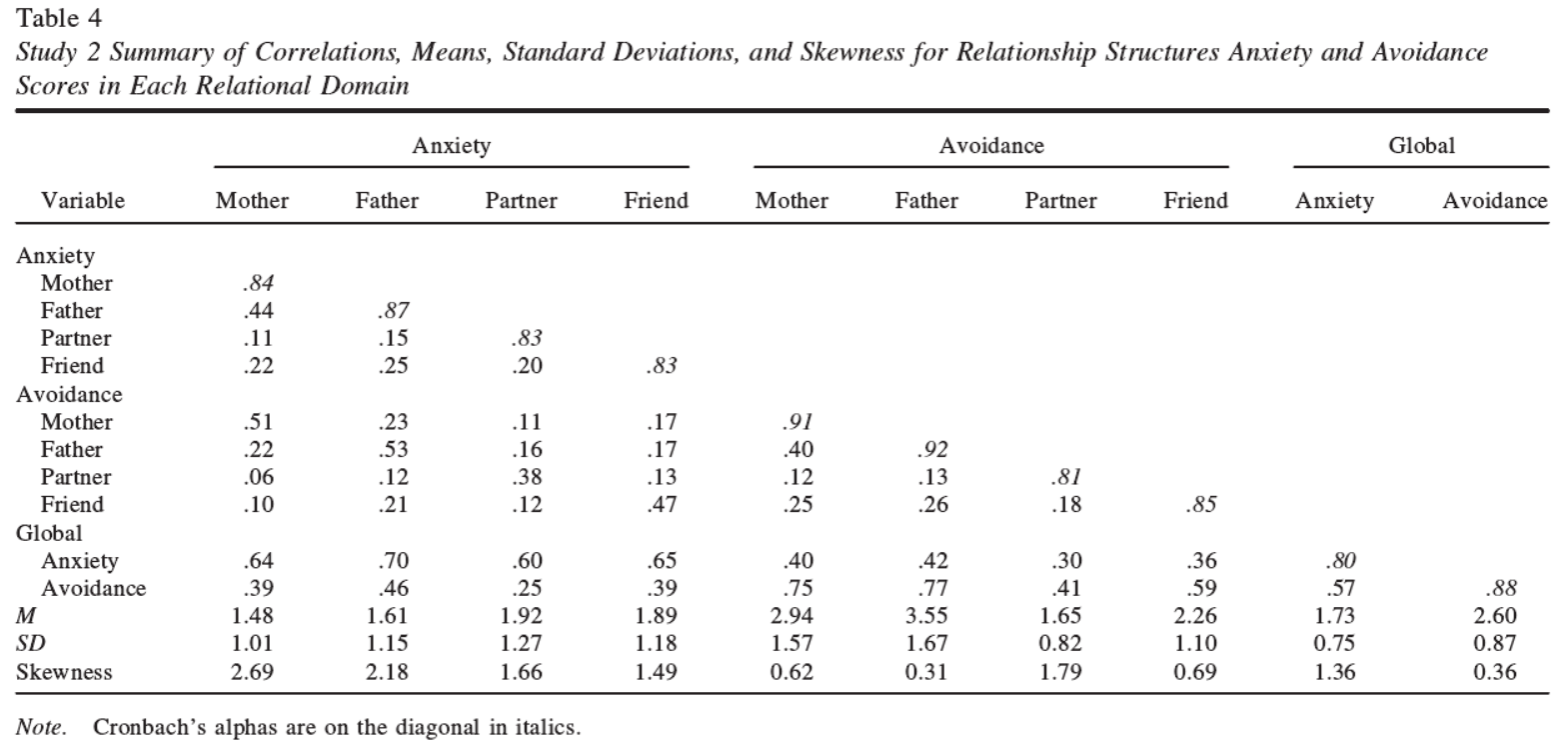亲密关系经历量表修订版之关系结构问卷
七点评分:
非常不同意
很不同意
稍不同意
说不清
稍微同意
很同意
非常同意
题目
1.当我遇到问题求助于他/她,总能得到帮助
2.我通常与他/她讨论我的问题与困扰
3.我愿意与他/她商量事
4.我发现我很容易依赖他/她
5.对这个人敞开心扉令我感到不舒服
6.我不愿意将内心深处的感受告诉他/她
7.我经常担心他/她不是真的在乎我
8.我害怕他/她会抛弃我
9.我担心他/她并不像我在乎他/她那样在乎我

|
|
Anxiety |
Avoidance |
Global |
|||||||
|
Variable |
Mother |
Father |
Partner |
Friend |
Mother |
Father |
Partner |
Friend |
Anxiety |
Avoidance |
|
Anxiety |
|
|
|
|
|
|
|
|
|
|
|
Mother |
.84 |
|
|
|
|
|
|
|
|
|
|
Father |
.44 |
.87 |
|
|
|
|
|
|
|
|
|
Partner |
.11 |
.15 |
.83 |
|
|
|
|
|
|
|
|
Friend |
.22 |
.25 |
.20 |
.83 |
|
|
|
|
|
|
|
Avoidance |
|
|
|
|
|
|
|
|
|
|
|
Mother |
.51 |
.23 |
.11 |
.17 |
.91 |
|
|
|
|
|
|
Father |
.22 |
.53 |
.16 |
.17 |
.40 |
.92 |
|
|
|
|
|
Partner |
.06 |
.12 |
.38 |
.13 |
.12 |
.13 |
.81 |
|
|
|
|
Friend |
.10 |
.21 |
.12 |
.47 |
.25 |
.26 |
.18 |
.85 |
|
|
|
Global |
|
|
|
|
|
|
|
|
|
|
|
Anxiety |
.64 |
.70 |
.60 |
.65 |
.40 |
.42 |
.30 |
.36 |
.80 |
|
|
Avoidance |
.39 |
.46 |
.25 |
.39 |
.75 |
.77 |
.41 |
.59 |
.57 |
.88 |
|
M |
1.48 |
1.61 |
1.92 |
1.89 |
2.94 |
3.55 |
1.65 |
2.26 |
1.73 |
2.60 |
|
SD |
1.01 |
1.15 |
1.27 |
1.18 |
1.57 |
1.67 |
0.82 |
1.10 |
0.75 |
0.87 |
|
Skewness |
2.69 |
2.18 |
1.66 |
1.49 |
0.62 |
0.31 |
1.79 |
0.69 |
1.36 |
0.36 |
常模来源:
Fraley R C, Heffernan M E, Vicary A M, et al. The Experiences in Close Relationships-Relationship Structures questionnaire: a method for assessing attachment: orientations across relationships[J]. 2011, 23(3):615.
Instructions used for each relationship domain
A. Please answer the following questions about your mother or a mother-like figure.
B. Please answer the following questions about your father or a father-like figure.
C. Please answer the following questions about your dating or marital partner. Note: If you are not currently in a dating or marital relationship with someone, answer these questions with respect to a former partner or a relationship that you would like to have with someone.
D. Please answer the following questions about your best friend.
Questionnaire items
- It helps to turn to this person in times of need.
- I usually discuss my problems and concerns with this person.
- I talk things over with this person.
- I find it easy to depend on this person.
- I don't feel comfortable opening up to this person.
- I prefer not to show this person how I feel deep down.
- I often worry that this person doesn't really care for me.
- I'm afraid that this person may abandon me.
- I worry that this person won't care about me as much as I care about him or her.
Two scores, one for attachment-related avoidance and the other for attachment-related anxiety, should be computed for each interpersonal target (i.e., mother, father, partner, friend). The avoidance score can be computed by averaging items 1 - 6, while reverse keying items 1, 2, 3, and 4. The anxiety score can be computed by averaging items 7 - 9. These two scores should be computed separately for each relationship target.
Update on Global/General Attachment - August 2014
We have recently begun supplementing the ECR-RS with an item set that is designed to more explicitly probe people's general attachment styles. We did not want our general measure to be a literal linear combination of the relationship-specific measures because that operation made it difficult to study how general and relationship-specific representations may change together.
The instructions we are currently using to assess "general" or "global" attachment are as follows: "Please read each of the following statements and rate the extent to which you believe each statement best describes your feelings about close relationships in general." We then follow those instructions with 9 items that are similar in theme to those used to assess relationship-specific attachment. (Moreover, they are keyed in a similar way. The first 6 items tap avoidance with the first 4 items reverse keyed; the last 3 items tap anxiety.)
- It helps to turn to people in times of need.
- I usually discuss my problems and concerns with others.
- I talk things over with people.
- I find it easy to depend on others.
- I don't feel comfortable opening up to others.
- I prefer not to show others how I feel deep down.
- I often worry that other people do not really care for me.
- I'm afraid that other people may abandon me.
- I worry that others won't care about me as much as I care about them.
来源:http://labs.psychology.illinois.edu/~rcfraley/measures/relstructures.htm

加入心理学网,获得更多
查找量表、在线测试、分享量表,可加微信:57762787;亦可 发文求助